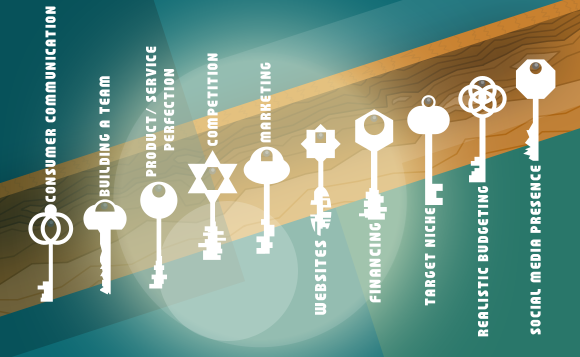
The past few years have seen tech startups sprout from across the globe. As almost every business develops some form of automation, tech companies and individuals have reaped big from simple, successful startups which grew to become multi-million dollar industries. But the success stories for these companies were in no way a simple wish come true. Each of the giant tech companies today had to strategize and make sure that they focused on the right factors so that they would dominate in the industry and maintain steady growth through the years.
There are many key points for a potentially successful startup to follow. Here are a few common factors which startups must pay attention to if they want a higher probability of success.
TARGET NICHE
A common factor for every tech startup is that they look to provide a solution for a certain existing problem in the market. Startups must make sure that what they offer is a real solution and is something which users will find necessary. Startup companies must conduct thorough research on their target users, find a missing piece in their daily activities and see how they can turn that into a technical solution. Finding a target niche helps a startup find its company’s main objective which is a crucial base for the company to build itself up from. Lack of it may lead to misplaced priorities, reinventing of a tech wheel or creation of software that is not feasible for anyone.
REALISTIC BUDGETING
Budgeting should be the first financial step for every startup.The budget must be a comprehensive one, providing clear details on how the money, if acquired, will be spent. Startups must make sure that their budgets are not over the top or exaggerated, especially if they are relying on financing from loans. Also, while drawing up a budget, it is important to set realistic expense limits so that the company avoids bankruptcy before even taking off.
FINANCING
Once a startup has established what kind of solution they want to provide and how they want to provide it, they must find ways to make sure that their innovation receives the funding it requires to kick start. Most startups usually opt for external funding when they are at the early stages of growth. This funding can come in the form of loans or investment deals. Startups must ensure that they adhere to their drawn budget and avoid asking for more than the required capital.
BUILDING A TEAM
Whether a team is required or not depends on how much workload there is and what kind of tech solution is being built, as well as the availability of personnel. For startups that require a team, their success lies greatly in what kind of team is doing the work. An effective startup team will consist of personnel who are experienced in the field, competitive and have the willingness to work, and those who are patient and cooperative. Teams must also have top-notch leaders so that coordination and workflow are kept at maximum potential.
MARKETING
The proposed budget must take care of the marketing needs of the startup solutions in question. Whether it’s creation and broadcasting of video ads, billboards or marketing vendors, startups must make sure that they have effective marketing tools so that they can effectively reach their target clients and customers. Marketing, however, goes beyond funding. Startups must come up with creative and captivating ways of getting the attention of their potential clients. This requires a clear understanding of their target users as earlier explained, except it goes beyond needs into their daily interactions. The use of trends and modern communication means is essential in getting the word about your startup to your clients.
SOCIAL MEDIA PRESENCE
Social media has become a mandatory part of marketing for every startup as it is the easiest way to reach out to many users at once. For a startup, taking time to open social media accounts can help in creating more awareness for the company. Startups should go a step further and ensure that they have customized their social media pages to look be captivating so that it can capture the attention of a visiting user. Investing both time and money in coming up with a creative and interactive social media presence is a significant step towards reaching out to billions of users worldwide.
WEBSITES
Contrary to popular belief, websites are an important factor for all types of businesses, whether they are startups or already established companies. While social media interaction may be the easiest way to interact with users, sometimes there is too much information to sift from due to contribution from other users. Furthermore, companies cannot express the services they offer extensively through social media. The establishment of a website allows companies to showcase their products and services in a unique and more detailed way.
PRODUCT/ SERVICE PERFECTION
While the factors mentioned above are crucial for the success of a startup, what matters the most is the product or service which the startup offers. It is the most important factor of the business and is what determines whether or not the business will grow. It is important, therefore, to focus on finding ways to improve the product in question. Whether it is in packaging, user-friendliness, interfaces or other factors, startups must ensure that consumers love the solution they are selling.
CONSUMER COMMUNICATION
Feedback, inquiries and FAQs are the most common ways for consumers to interact with the business. Startups must set up proper communication channels to ensure that their consumers are reached out to in time and that their questions and concerns are answered in the clearest way possible to prevent unwanted errors. Call centers, emails, and social media are a few ways which a startup can implement a communication network.
COMPETITION
The reality of the tech world is that there will always be a form of competition out there somewhere. It would be unwise to ignore what your competitors are doing. This awareness helps one to draw out ideas on how to improve their own startup company or idea. The dynamic nature of the tech world allows more than one solution to a problem, so a competitive startup will analyze their competition and ensure that what they have to offer is a better option for users. Rather than viewing competition as just another member of the race to success, considering them as a learning platform helps a startup to improve their products and services so that they are assured of success.


